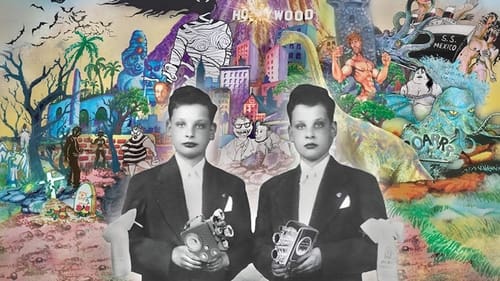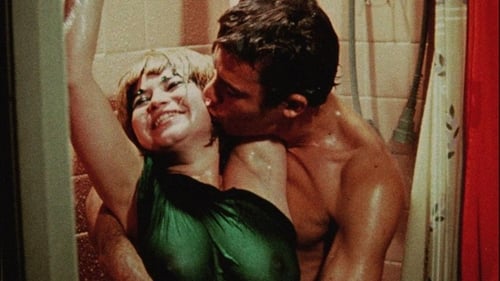
Self
It Came from Kuchar is the definitive, feature documentary about the legendary, underground filmmaking twins, the Kuchar brothers. George and Mike Kuchar have inspired two generations of filmmakers, actors, musicians, and artists with their zany, "no budget" films and with their uniquely enchanting spirits.

Herself
This three-part mini-series explores the mysterious and the mundane in a splash of digital dioramas that wipe across the screen in a cascade of electronic barfs. Zeroing in on the paranormal theories of UFO author John A. Keel, this leisurely exposition, which was funded by the Rockefeller Foundation, sweeps the viewer into a candy-colored world of scintillating mysteries made all the more intriguing by culinary digressions.

In a garden of roses and memorabilia from darkest Africa, a man and woman ponder the joy of cooking and the companionship of cats. Goodies for the guts abound in this visual essay on feline friendship and far away places. An electronic voyage beyond the stench of house and garden that transports the viewer- and cat- to the promised land.

A drama in six episodes involving psychological breakdowns, marital showdowns, and messy obsessions. The characters include a wayward priest, a promiscuous school-teacher and her proctologist husband, teenage thrill killers, and an obsession-driven psychotherapist with an enema bag. Lots of special effects, as it moves quickly from one major crisis to another.

Seadrift is based on a story The Shadow Over Innsmouth by H.P. Lovecraft, and was shot partially in Marblehead Mass. Each section represents a synthesis of the various aspects and moods of the story. The sum total of the fragments expresses the atmosphere of the whole.

"One of Kuchar’s few feature-length works is this ribald pastiche to postwar Hollywood melodrama, that period when the studios were trying very hard to be adult. The intricate, overheated plot involves a nurse trapped in an unhappy marriage who escapes the big city in search of greener pastures in Blessed Prairie, Oklahoma. Swerving from earnest homage to dark satire, Kuchar simultaneously imitates and savages the legacy of Sirk, Preminger and Minnelli that inspired him, gleefully intertwining the suggestive and the scatological, while also pointing towards the later postmodern parodies of Cindy Sherman. The Devil’s Cleavage is also a rich time capsule of 1970s San Francisco, replete with cameos from Curt McDowell and Art Spiegelman." —hcl.harvard.edu

A ritualistic mood piece with colour-rich images

This movie was made mostly in Brooklyn during some very hot and empty evenings. Since the evenings were so empty, Jane Elford, the star, urged me to get started making another movie (we had completed PAGAN RHAPSODY the year before). I said "okay," and launched her in a photographed series of telephone calls, not really knowing who was going to be on the other end. I was interested at the time in irrational, neurotic responses and so the heroine was put into unstable situations that I dreamt up because I was making a movie with a plot and there should be some action .... Many of the stars appear nude and all I can say is that because of the heat and the general, overall feeling of the film which is one of the usual desperation and explosive emotions, I couldn't see any other way of them playing it. The general tone of everything was ... "Why even bother to get dressed?"

Edgar, an aristocrat, commissions Camillo to write a play based on an affair he had ten years ago with the Countess del Monaco. But Edgar first has to find a suitable actress to play the Countess – his search will lead to his own death.

Herself
The three faces (two women and one tranvestized man) in the series of close up, which are shot separately in their sexual process of the acting and the real, are intercut and edited making into a film. The sound is the voice of continuous laughing of a woman repeated from a loop-tape. What I try to realize in this film is the question of gender through the facial expression in sex between woman and tranvestized man, and the image in detail between the ac ting and the real life. When these factors are mixed, one can hardly distinguish one from the other.

Smith's third feature film was originally titled "The Kidnapping of Wendell Willkie by the Love Bandit," in reaction to the 1968 Presidential Campaign. Willkie was a liberal Republican who ran against FDR in the 1940's. It mixes B&W footage of Smith's creatures with old campaign footage of Willkie. The climax of the work appears to be the "auctioning" of the presidential candidate at the convention. - Flicker

Exhausted by a sexually frustrating home life in the Bronx, portly, 65-year-old Uncle Bojo tosses aside all responsibilities, leaves his wife, Stella, and sets out in search of adventures.

Self
"Parts of this film were shot for a mixed media show at the 'Electric Circus' in New York, and were later expanded and re-edited into the present form. A semi-documentary that gradually expands to a pure sight and sound experience. Music by Chambers Brothers." –B. C.

An abstract, rhythmically cut film with various images of women, some of whom are dancers. The sound track, which is semi-electronic, is composed and played by Cowan. –B. C.

" ENCYCLOPEDIA OF THE BLESSED culminates my involvement with artist Red Grooms and Mimi Gross. It is a diary of our work as we head for the Pacific Ocean in a suicidal plunge for theatrical infamy. The film traces the construction of two craven images made in the likeness of myself by Grooms and Gross. Then it switches to the sandhills of Nebraska where fat cattle walk around. There the film explores Grooms' biggest construction, "The Chicago Installation." The film rolls relentlessly onward to the West Coast showing, for the first time on any screen, a theatrical production we three put in the University of California. It marks my directorial debut on the stage and Red Grooms' comeback after ten years of exile from live theatre." - George Kuchar

The movie takes a rather negative look at things despite the fact that it was shot in reversal film. It depicts the turbulent relationships of disturbed individuals existing on various levels of an apartment house. Donna Kerness and her husband Hopeton Morris are lurid together and they are also pretty lurid when they're alone.

Having nothing to do with racial tensions, HOUSE OF THE WHITE PEOPLE is actually a chunk of film removed from a bigger chunk called UNSTRAP ME. It is a documentation of George Segal creating the basic elements for one of his statues preceded by rare glimpses into his own private museum. Donna Kerness serves as his live model. Walter Gutman sits on a chair and walks around a bit, being that he produced the film. Helen Segal, personifying the ageless saying, "behind every man there stands a woman," stands behind her man and also stands in front of him occasionally. The film is a unique invitation to view the hidden rituals of a famous artist and his infamous model, half naked, snowbound together on a lonely farm, with a silent wife and a notorious guest.

Marilyn Marmoset
A desperate, married woman meets a mysterious man who she blatantly desires. Through some twists and turns, things do not go over as well as she seems to wish.

"The whole film are non-art portraits of people in which they do what they want with this hat – and therefore, act or stand in front of my camera. It’s only love: therefore it can’t harm you". Joyce Wieland.

Margret (voice)
A young man's struggle with his sexuality overtakes his life, driving him deep into his subconscious where guilt and fears of physicality chase him still further. Cornered by an intangible terror, he realises he must either break out or break down.

Presented as loosely autobiographical, Hold Me While I’m Naked centres on the tribulations of an independent filmmaker, frustrated at every turn as he tries to make a film that pretends to artistic merit.

"A film counterpointing the hard reality of the present with the fantastic actuality or imagining of the idyllic past. This is best realized in the halting transition from the journey through time back to the watery one that evoked." –Ken Kelman

Corruption of the Damned might seethe with violence and sex, the two most attractive things you can put on the screen, but beneath them a twisted outlook pervades.

Princess Vivianna
The survivors of a nuclear war are taken care of by robots called "fleshapoids." One day one of the fleshapoids runs wild, kills its "mistress," and hides in the home of a human female, for whom it begins to develop feelings.

Baby Sharon
“LUST FOR ECSTASY is my most ambitious attempt since my last film…. I wrote many of the pungent scenes on the D train, and when I arrived on the set I ripped them up and let my emotional whims make chopped meat out of the performances and the story…. Yes, LUST FOR ECSTASY is my subconscious, my own naked lusts that sweep across the screen in 8mm and color with full fidelity sound.” – George Kuchar

A tender and realistic story of a scientist who falls in love with a mummy he has restored to life.

A lonely, bohemian poet befriends the good, the bad and the ugly in this rooftop drama set in New York's lower East side of Eden.

[A] cautionary tale about past-their-prime thespians caught up in a typically Kucharian vortex of madness. - Anthology Film Archives

The film combines teenage lust and deranged delinquency to create a cautionary tale for the ages.

“It glows with the embers of desire! It smokes with the revelation of men and women longing for robust temptations that will make them sizzle into maturity with a furnace-blast of unrestrained animalism. A film for young and old to enjoy.” —George Kuchar

An insane, deformed killer stalks the grounds of a resort house, bringing sudden violence to those of easy virtue and godlessness.

Big…Rousing…Memorable! The incredible war saga of our own boys in a Jap-infested jungle in the Botanical Gardens. Hear Lloyd Thorner sing the title song. You’ll come out whistling from both ends.

"A Tub Named Desire," the first movie with Donna Kerness, does not exist anymore, except for one 8mm print that was in George Kuchar's possession. The footage was taken apart, and some of it is included in "The Naked and the Nude." - Carnegie Museum of Art archive.




























